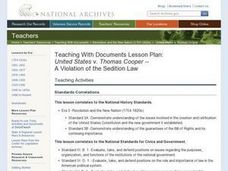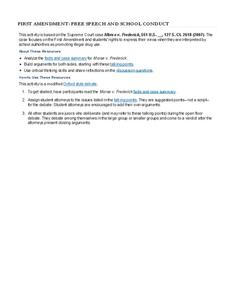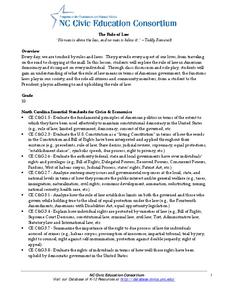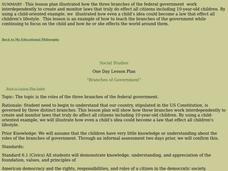Curated OER
Congress: The House of Representatives
This simple worksheet could accompany a text (as it indicates a chapter and section), but could also be given as a guide to independent research. Basic concepts of Congress are prompted through matching and multiple choice. This could be...
Judicial Learning Center
Why Study Landmark Cases?
Why study landmark Supreme court cases? A helpful lesson offers a brief but valuable argument for the importance of these cases in the field of criminology. It introduces scholars to some key terms necessary for studying court cases and...
Curated OER
United States v. Thomas Cooper --
Students compare the Alien and Sedition Act to the First Amendment. They read and analyze a primary document and write a synopsis. They brainstorm challenges to the Government or President of the US.
Administrative Office of the US Courts
Morse v. Frederick
If you stop a student from expressing views that advocate drug use, are you violating their right to free speech? Use the 2007 Supreme Court case Morse v. Frederick to discuss a nuanced interpretation of the First Amendment....
National Constitution Center
Voting Rights since the Fifteenth Amendment
What does it mean to have the right to vote? To what extent have interpretations of the Fifteenth Amendment changed over time? Young historians examine and analyze primary source documents, an interactive website, and historical analysis...
Curated OER
Constitution Repatriation Simulation
Students work cooperatively in groups to present the specific needs of an assigned territory to a mock meeting of government officials in an attempt to amend an existing law.
Curated OER
Law Day: Constitutional Law Outline
Young scholars receive information about laws. Some of the categories include powers of the federal government, federal powers vs. state powers, and the Bill of Rights. It is in an outline form that looks like the student follows along...
National Woman's History Museum
Women's Suffrage Movement
The National Women's History Museum offers a 20-slide presentation that details the history of the Women's Suffrage Movement from its creation in the 1830s through the passage of the Nineteenth Amendment in 1920.
PBS
Ken Burns: Jackie Robinson - A Journey Back to Separate but Equal Conditions
Baseball great Jackie Robinson fought for social justice. His efforts to push for equal access are detailed in an episode from from the Ken Burns: The Jackie Robinson Collection. After viewing the clip, class members engage in a...
Judicial Learning Center
Do You Know Your Bill of Rights?
The Bill of Rights is much more than an important piece of paper! The rights cover everything from freedom of speech to the right to remain silent if arrested. Scholars find out their own rights by answering the questions in the form of...
National Endowment for the Humanities
The Declaration of Independence in Six Parts
Everyone knows that the Declaration of Independence is important, but what does it actually say? Members of American history classes analyze the Founding Fathers' arguments against British tyranny and for a more perfect union with a...
DocsTeach
The 19th Amendment and the Road to Universal Suffrage
Your vote matters! An informative activity focuses on the Nineteenth Amendment and explains how it paved the way for universal voting rights. Young historians analyze several documents and a complete a worksheet, describing the impact of...
Anti-Defamation League
The Road to Brown
As part of the study of segregation in U.S. schools, scholars research and create a timeline of events that led to the historic Supreme Court case, Brown V. Board of Education. Groups research a topic or event that led to the decision,...
Curated OER
Advanced Matching-united States Government Part 1
In this U.S. government instructional activity, 5th graders study the different branches of government. Students match 13 terms to the correct definition that is provided.
Carolina K-12
The Rule of Law
What functions do laws serve in our society? Your learners will be guided through several interactive activities to address this question, and to consider the impact of rule of law in American society.
EngageNY
Studying Conflicting Interpretations: Perspectives on Plessy v. Ferguson: Part 3
Scholars closely read Justice John Marshall Harlan's dissenting opinion in the Plessy v. Ferguson case, seeking to understand why he disagreed with the court's decision that racial segregation laws for public spaces were constitutional....
DocsTeach
To What Extent was Reconstruction a Revolution? (Part 1)
Some scholars consider the Civil War and Reconstruction a second American Revolution. Class members weigh in after examining primary sources, including a Congressional resolution calling for the Fifteenth Amendment and the credentials of...
Curated OER
Classroom Rules
In this classroom rules activity, students come up with class rules and write them in the form of the constitution. Students can come up with as many rules as the teacher assigns.
Curated OER
First Things First: Using the Newspaper to Teach the Freedoms of the First Amendment
Students use the newspaper as a tool to make connections about what the five freedoms guarantee in the First Amendment. For this first amendment lesson plan, students analyze events in the newspaper to form conclusions about the freedoms...
Curated OER
Branches of Government
Young scholars explore the three branches of government. In this government and U.S. history lesson, students listen to a story about a boy who attempts to sponsor a bill to ban cartoons. Young scholars interview three teachers who each...
Curated OER
Bill Of Rights
Students examine Supreme Court cases. In this U.S. government lesson, students watch a video about the Bill of Rights and then research 4 Supreme Court cases using the noted web site. Students analyze the presented information and write...
Curated OER
Letters to the Government
Seventh graders examine how to be active participants in their local, state, or federal governments. They create a powerpoint presentation and write a letter to one of their governmental representatives about a problem and solution of...
Curated OER
Are We Free Yet?
Students read excerpts from several Freedom Documents, evaluate amount of freedom guaranteed by each document, and rank documents on scale to determine which grant greatest and least amount of personal freedom.
Curated OER
The Supremes
High schoolers discuss steps cases go through to reach Supreme Court, examine Bill of Rights, and rank rights in order of importance to them. Students then research Supreme Court case dealing with one of first ten amendments, and write...

























